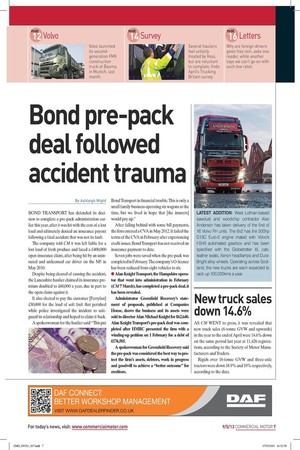Bond pre-pack deal followed accident trauma By Ashleigh Wight BOND
Page 5

If you've noticed an error in this article please click here to report it so we can fix it.
TRANSPORT has defended its decision to complete a pre-pack administration earlier this year, after it was hit with the cost of a lost load and ultimately denied an insurance payout following a fatal accident that was not its fault.
The company told CM it was left liable for a lost load of fresh produce and faced a £400,000 open insurance claim, after being hit by an uninsured and unlicensed car driver on the M5 in May 2010.
Despite being cleared of causing the accident, the Lancashire haulier claimed its insurance premium doubled to £60,000 a year, due in part to the open claim against it.
It also elected to pay the customer [Ferryfast] £30,000 for the load of soft fruit that perished while police investigated the incident to safeguard its relationship and hoped to claim it back.
A spokeswoman for the haulier said: "This put Bond Transport in financial trouble. This is only a small family business operating six wagons at the time, but we lived in hope that [the insurers] would pay up."
After falling behind with some bill payments, the firm entered a CVA in May 2012. It failed the terms of the CVA in February after experiencing credit issues. Bond Transport has not received an insurance payment to date.
Seven jobs were saved when the pre-pack was completed in February. The company's 0-licence has been reduced from eight vehicles to six.
• Alan Knight Transport, the Hampshire operator that went into administration in February (CM 7 March), has completed a pre-pack deal, it has been revealed.
Administrator Greenfield Recovery's statement of proposals, published at Companies House, shows the business and its assets were sold to director Alan Michael Knight for £62,640. Alan Knight Transport's pre-pack deal was completed after HM RC presented the firm with a winding-up petition on 1 February for a debt of £174,585.
A spokeswoman for Greenfield Recovery said the pre-pack was considered the best way to protect the firm's assets, debtors, work in progress and goodwill to achieve a "better outcome" for creditors.



















































